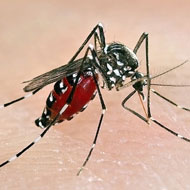Asian tiger mosquito found in the UK

Aedes albopictus, is a known vector for zika, dengue and chikungunya virus.
Asian tiger mosquito eggs have been discovered in the UK for the first time, Public Health England (PHE) has confirmed. The mosquito, Aedes albopictus, is a known vector for zika, dengue and chikungunya virus.
PHE said a small number of eggs were found in one trap in Kent during routine surveillance. Enhanced monitoring was put in place in the area but no further evidence of the mosquito has been found so far.
In a statement, it said: "There is currently no risk to public health in the UK."
As a precaution, the local authority was advised to use insecticide as a method of control. PHE will continue to monitor the situation closely.
Aedes albopictus has achieved widespread global distribution as a result of human activities, such as the movement of tyres.
Last year, a report by PHE scientists in the Lancet Infectious Diseases journal suggested warmer temperatures in the UK could provide favourable conditions for various mosquitos to breed. PHE began monitoring places where the insects lay eggs, such as used tyres.



 The BSAVA has opened submissions for the BSAVA Clinical Research Abstracts 2026.
The BSAVA has opened submissions for the BSAVA Clinical Research Abstracts 2026.